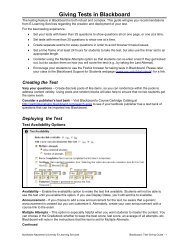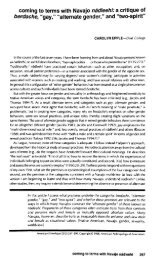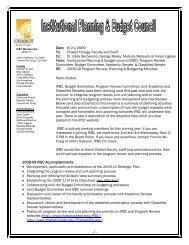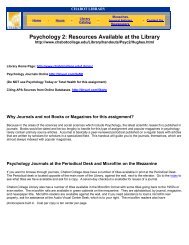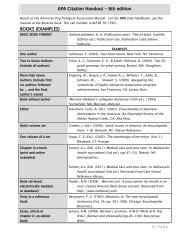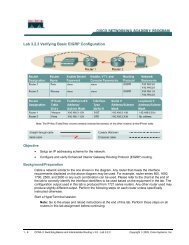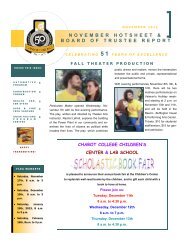BSI Self-Assessment Summary.rtf - Chabot College
BSI Self-Assessment Summary.rtf - Chabot College
BSI Self-Assessment Summary.rtf - Chabot College
You also want an ePaper? Increase the reach of your titles
YUMPU automatically turns print PDFs into web optimized ePapers that Google loves.
Effective Practice Area C: Staff Development<br />
C.1: Administrators support and encourage faculty development in basic skills, and the<br />
improvement of teaching and learning is connected to the institutional mission.<br />
C.2: The faculty play a primary role in needs assessment, planning, and implementation of<br />
staff development programs and activities in support of developmental education programs.<br />
C.3: Staff development programs are structured and appropriately supported to sustain them<br />
as ongoing efforts related to institutional goals for the improvement of teaching and learning.<br />
C.4: Staff development opportunities are flexible, varied, and responsive to developmental<br />
needs of individual faculty, diverse student populations, and coordinated programs/services.<br />
C.5: Faculty development is connected to intrinsic and extrinsic faculty reward structures.<br />
The relationship between staff development and basic skills education has emerged recently through<br />
several different projects, particularly as funded by the state Basic Skills Initiative and the Carnegie<br />
grant. The individuals participating in these projects, of course, received the most direct professional<br />
development around basic skills education, but benefits of this work have spread to the college at large<br />
through forums like Flex Day (e.g. screenings and discussions of Carnegie-funded videos Reading<br />
between the Lives and Going the Distance; workshops featuring results from basic skills projects in<br />
Math, History, the Puente Project, service learning, Springboard to Transfer, research into the<br />
“academic sustainability gap” holding back so many developmental students). Beyond these projects,<br />
the long-standing New Faculty Group has been a place where new full-time instructors receive training<br />
and support in some of the effective classroom practices highlighted in the <strong>BSI</strong> Literature Review (e.g.<br />
using Classroom <strong>Assessment</strong> Techniques, designing good reading assignments). Faculty/staff<br />
participating in special programs (e.g.: EOPS, Puente) also receive regular professional development,<br />
some relating to basic skills education.<br />
Outside of specific projects/programs, there has been little coordinated, college-wide attention to the<br />
area of developmental education. Staff development funds are overseen by a committee that includes<br />
developmental faculty, but these funds are distributed for conference-attendance in general (not<br />
developmental education in particular). Staff development in developmental education has been<br />
constrained by two main factors: limited time for faculty to come together, limited financial resources to<br />
organize and fund such work. <strong>College</strong> hour has been eroded by construction-related scheduling<br />
changes, and while the quality of recent Flex Day offerings has been strong, two days a year are not<br />
sufficient time for faculty to come together on matters of teaching and learning. Many members of the<br />
committee expressed interest in expanding professional development opportunities in developmental<br />
education – both within their disciplines (with funding for adjunct faculty to participate) and across<br />
disciplines. This need has also been highlighted in the proposal being drafted now for a Title 3 grant,<br />
and as an area for future attention within a new Center for Teaching and Learning to be housed within<br />
the college-wide Learning Connection.





